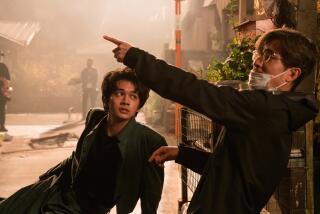The Growth of Japan’s Literary Bonsai
TAMA, Japan — Anyone seeking the most telling item on the front page of Japan’s best-selling newspaper would do well to skip the headlines and go straight to the poetry column.
In a corner next to the weather report, Yomiuri Shimbun’s readers skewer politicians, news events, social trends and especially themselves--all in 17 elegant syllables.
Cynical or poignant, the tiny poems are literary bonsai, trendy evidence of the traditional Japanese genius for manicuring natural (and human) anarchy into art.
Haiku is making a big comeback in Japan, and freshest of all is this informal style of haiku, called senryu, published daily in Japan’s three top newspapers as well as in a growing number of magazines. Unapologetically populist, senryu demands the same brevity as traditional haiku--one unbroken line in the original Japanese--but allows the poet the shocking liberties of expressing emotion and writing about topics other than the seasons.
Here is the delicious guilt of a procrastinating office worker:
*
Shall I do it now?
Shall I do it after lunch?
Is it already 5?
*
The latest fashion is for “current events senryu” and “salaryman senryu,” in which ordinary Japanese use a time-honored format to write about the foibles of modern life: the heartbreak of a phone conversation cut short by a lover with call waiting; the loneliness of the long-distance commuter; the cynical certainty that voters are being snookered by politicians; the zinging sensation of well-deserved criticism from an all-too-adult child.
“The basic theme is anxiety,” said Sanryu Bito, who edits the current events senryu column for Yomiuri Shimbun. In a Japan gripped by new economic and moral uncertainty, senryu works have tackled fear of firing and parents’ laments over children whose expensive educations have not helped them land jobs.
*
Daughter, get married
Before papa’s job disappears.
-- Mother Knows Best.
*
Bito sorts through about 500 postcards a day containing readers’ submissions and prints what he thinks are the five best verses. He says some of his contributors are so obsessed with senryu that they carry around postcards pre-printed with his address so that they can jot down and mail off their poems from wherever the muse happens to strike them.
Last year, senryu writers grappled with the sarin gas attacks on the Tokyo subway system, an act of terrorism that profoundly rattled the Japanese national psyche. During the summer, popular themes included food-poisoning outbreaks, the no-hitter pitched by the Dodgers’ Hideo Nomo--a good subject, because his name uses only two precious syllables--and the evergreen political topics of taxes, corruption and broken promises.
*
A public pledge expires
the day the votes are counted.
-- Shunko Takai
*
Domestic concerns appear to be foremost on the writers’ minds, but a number of senryu authors were also seized by the urge to comment on the state of Russian President Boris N. Yeltsin’s health. These two verses appeared in the newspaper Asahi Shimbun:
*
The nuclear button
in the hospital.
How frightening.
-- Mitsuo Amano
The world’s stethoscope
to Yeltsin’s chest.
-- Takeshi Mayuzumi
*
A story of an ape who rescued an injured child inspired this:
*
Taught humanism
By a gorilla.
-- Mitsuo Ishii
*
Traditional haiku poems, long admired as spare but indelible sketches of nature, have sparked haiku movements around the world. There is now haiku in Romanian, and there is a flourishing haiku culture on the Internet.
In Japan, traditional verse--with its traditional restrictions--was thought to be growing stale in the postwar period. But it began a renaissance in 1987 with the publication of “Salad Diary Days,” a book of modern tanka poetry by Machi Tawara, who was just 25. She preserved the traditional syllable rhythm of tanka, a verse form related to haiku, but wrote in stream-of-consciousness slang.
In one vintage Tawara tanka, the poet wonders whether she can accept a marriage proposal made in the bluntest possible language over two canned cocktails of shochu, a cheap distilled rice liquor. Her book captivated readers, inspired thousands of young women to take up what had been a mostly male art and sold a staggering 2.7 million copies.
The last several years have brought a haiku boom of unprecedented proportions in Japan. There are at least 10 haiku magazines, a haiku television program and more than a million regular haiku writers--which makes poetry about as popular as fishing.
“Everyone wants to express themselves, and haiku is short, so it’s easy,” said Hiroji Sagawa, editor of Haiku Asahi magazine, which sells 100,000 copies a month. “Also, people have become affluent and they have time to spare.”
Senryu, haiku’s low-brow cousin, can claim only about 40,000 regular writers, according to Bito, who heads the Japan Senryu Pen Club. But senryu, which was born in the 18th century, has a mass following in the popular press. Like manga, the Japanese comic books, senryu gets little critical respect but has its finger on the pulse of modern Japan.
The best senryu works are reminiscent of Ogden Nash poems--fast and funny. Bad ones can read like stale greeting cards or statements of insipid truths.
Most are hopelessly untranslatable. But Japan Airlines’ in-flight magazine, Winds, has been bravely publishing English translations of selected senryu from the newspaper Mainichi Shimbun for the last three years. Managing Editor Stephen Forster’s reject file is full of senryu that are amusing only within the Japanese cultural context, such as poems about o-miai, the infamous first meeting between prospective partners to an arranged marriage, and “conveyor-belt sushi,” the automat-style raw fish bars.
Many Japanese intellectuals shun senryu as lightweight. But proponents of the more literary form of senryu are trying to chip away at that prejudice.
“I was never interested in haiku,” said 67-year-old Shinko Tokizane, whose book of love senryu sold more than 100,000 copies. “When I started writing senryu, haiku was only exploring the beauty of nature. I’m more interested in human beings. . . . My starting point is the self.”
Tokizane, who edits senryu columns for two popular magazines, recently called for readers to submit verses to the Asahi Graph magazine on the topic of, well, eggplant. The resulting two-page spread, published with a soft-focus photograph of a luxuriant eggplant, was anything but orthodox:
*
Seedling eggplant
Intending to grow purple.
-- Tokizane
*
Other senryu aficionados argue that the verse should not adopt literary pretensions, because its charm is its immediacy. “Isn’t it meaningless if we write about things that have no connection to the era we’re living in now?” said Takashi Nakahata, who edits Mainichi Shimbun’s senryu column.
Nakahata is not a professional poet; he runs an advertising agency. He does not write senryu himself because he finds it too much like his work as a copywriter. He believes everyone--down to the greengrocer--should be able to use senryu to say what’s on his or her mind.
Bito worked at a newspaper for years before turning to poetry full time. Now he teaches a popular senryu class to a group of retirees at a community center in Tama, a small city near Tokyo.
Student Toyoko Koike, 66, said she takes the senryu class as part of a personal “senility prevention” program and finds penning poetry a good way to let off steam.
“The Japanese situation, politically and socially, is in upheaval right now, and people keep all their pent-up anger inside them,” she said. “People can relieve their stress with senryu.”
In salaryman senryu, beleaguered Japanese office workers--including a growing number of women--do just that. Salaryman senryu first appeared in 1987, when Daichi Life Insurance invited the public to submit verses as a promotional contest. Now the contest is an annual event that has produced five volumes of the mostly anonymous verses and sold more than 630,000 copies.
*
Office politics are, of course, a staple:
Don’t work hard
Or I’ll get fired.
-- So-So Man
*
My dog got an ulcer
From listening to my complaints.
-- Good Girl at Work
*
So are family politics:
I have no seat
In the coalition
Between my wife and children.
*
Perhaps most poignant are the many senryu that evoke the alienation of the foot soldiers of Japan Inc., such as this:
*
Long commute.
Morning stars, evening stars,
Child’s sleeping face.
Researcher Chiaki Kitada in The Times’ Tokyo Bureau contributed to this report.
More to Read
Sign up for our Book Club newsletter
Get the latest news, events and more from the Los Angeles Times Book Club, and help us get L.A. reading and talking.
You may occasionally receive promotional content from the Los Angeles Times.






